Donald Trump campaigns in Las Vegas and Hillary Clinton stumps in Florida.
- The FBI will examine newly discovered emails possibly linked to Hillary Clinton’s private server
- Trump’s campaign says the new email inquiry shows Clinton’s lack of trustworthiness
- Clinton turns to Scripture: ‘Suffering produces endurance’
- Clinton calls FBI director’s announcement about newfound emails ‘deeply troubling’
- Here’s what you need to know about the FBI’s new inquiry into emails
FBI obtains warrant to examine newfound emails that could be related to Clinton investigation
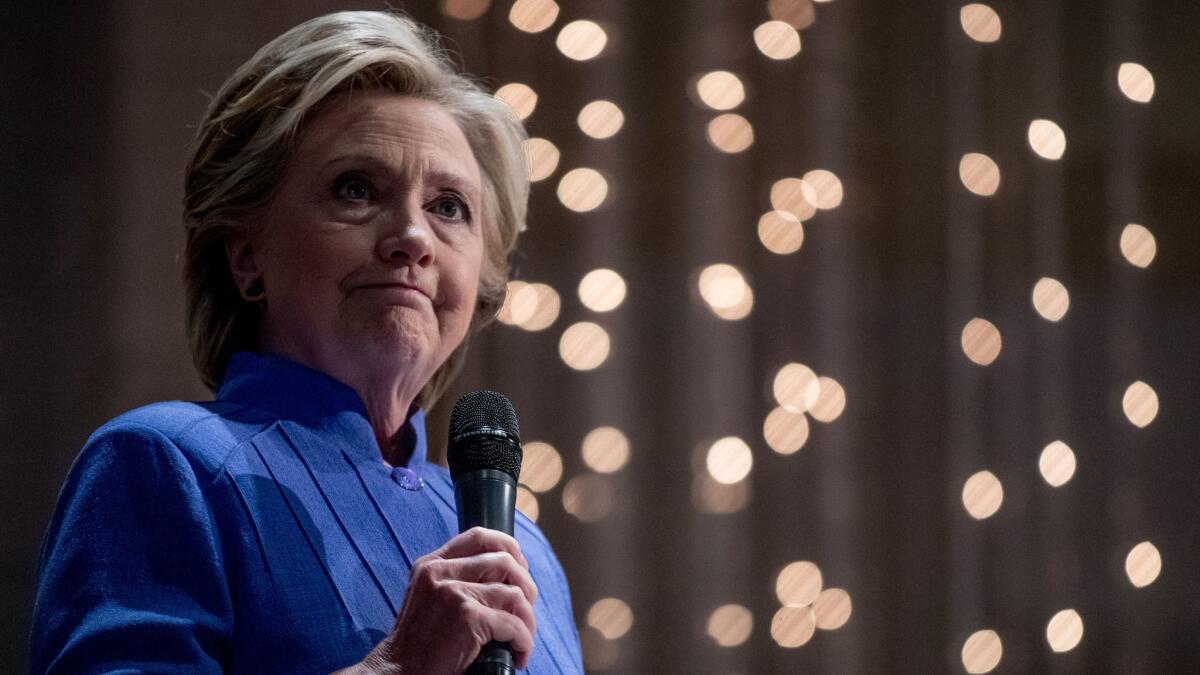
FBI agents investigating Hillary Clinton’s handling of classified information on a private email server Sunday obtained a warrant to search a computer used by former Rep. Anthony Weiner for communications they believe may be related to their inquiry, according to a law enforcement official familiar with the investigation.
Agents stumbled across the potentially relevant emails while investigating whether Weiner violated federal laws while exchanging sexually explicit texts with a 15-year-old girl in North Carolina. Weiner is the estranged husband of one of Clinton’s closest aides, Huma Abedin.
While searching the computer in recent weeks, agents found potentially thousands of Abedin’s emails related to her work for Clinton at the State Department, another law enforcement official said.
The laptop contains hundreds of thousands of emails, most of them Weiner’s, a third official said.
Sen. Harry Reid says FBI director may have broken law with new email examination
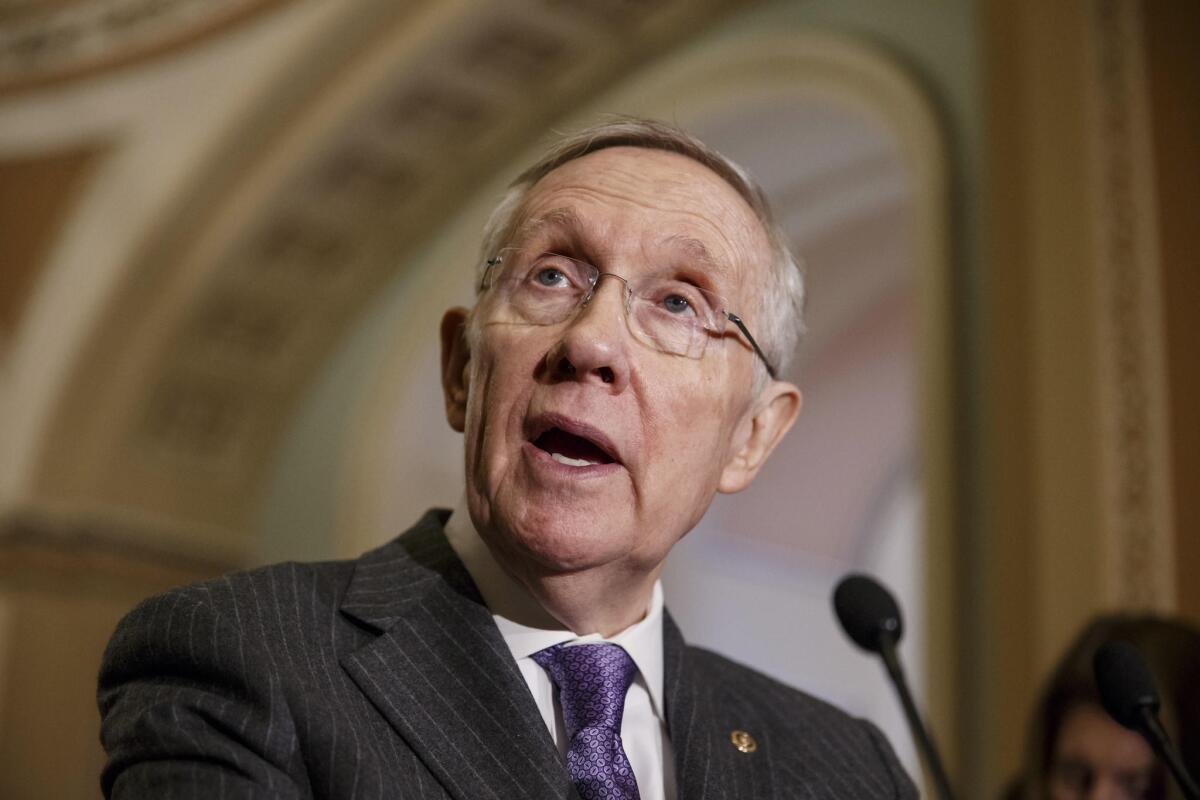
Senate Minority Leader Harry Reid accused FBI Director James B. Comey on Sunday of misusing his authority to influence the presidential election by telling Congress that investigators were examining additional emails that could be related to Hillary Clinton’s private server.
Comey’s notification to Congress two days ago risked “tarring Secretary Clinton with thin innuendo,” a possible violation of the Hatch Act, which prevents use of government resources for political purposes, Reid wrote in a letter to Comey.
Reid included another potentially explosive allegation in his letter, saying Comey had refused to release information about ties among Donald Trump, his campaign and the Russian government.
Reid did not detail what that information might be. But Democrats have repeatedly raised concerns about Trump’s sympathetic tone toward Russia, an issue that has only grown with the release of internal Clinton campaign emails that U.S. authorities suspect were obtained by Russian hackers.
“The clear double standard established by your actions strongly suggests that your highly selective approach to publicizing information, along with your timing, was intended for the success or failure of a partisan candidate or political group,” Reid wrote.
Donald Trump touts early vote turnout but the data complicate his rosy picture
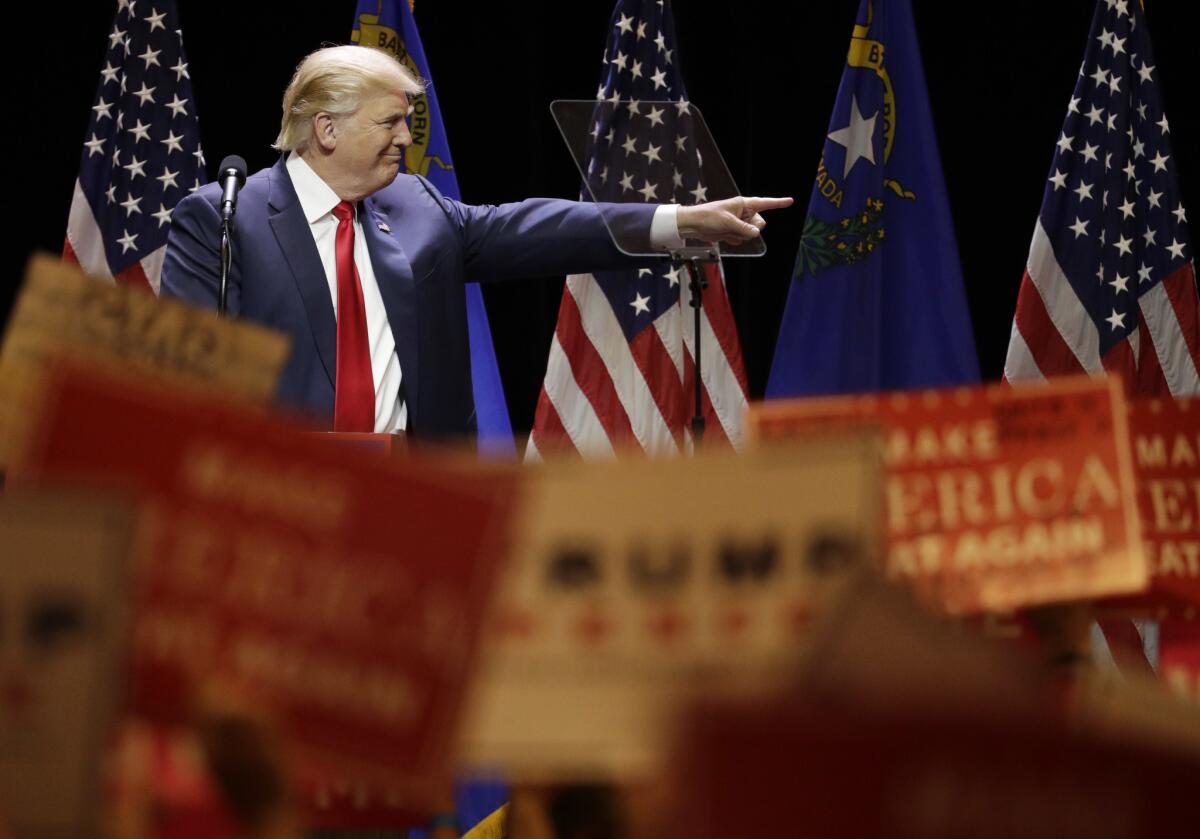
The early vote is surging in states such as Texas and North Carolina, and to Donald Trump, that’s nothing but good news.
At a rally in Las Vegas on Sunday, Trump touted higher-than-usual voting rates as proof that his campaign has energized a base of previously inactive voters who will power the GOP presidential nominee to victory on Nov. 8.
But the political data wonks who are obsessively parsing incoming data paint a more nuanced picture of the early vote so far -- and their analysis has shown more positive signs for Hillary Clinton than Trump.
Trump pointed to Sid Miller, the Texas agriculture commissioner, who has said the record early vote turnout in the state is attributable entirely to Trump supporters.
“There are more people voting now than we ever had ever in an election,” Trump said, paraphrasing Miller. “People we’ve never seen before, people who have never voted before, and they’re all voting for Trump.”
But the on-the-ground analysis is murkier. There is high turnout in Republican-dominated suburbs around Houston and Dallas, but also in Democratic-leaning areas around Austin and El Paso.
(There are other reasons why reliably GOP Texas is unlikely to swing blue, as The Times’ Mark Z. Barabak explains.)
Trump extended his triumphant tone to crucial battleground states.
“The same thing is happening in Florida,” he said. “The same thing happening in North Carolina.”
But an NBC/Wall Street Journal poll released Sunday showed that Clinton was leading among early voters in both states. In Florida, 54% of likely voters who had already voted backed Clinton, while 37% backed Trump. The Republican’s fortunes were flipped among those who had not yet voted; he led 51% to 42%.
In North Carolina, Clinton’s lead among early voters was even larger: 61% versus 33% for Trump.
Early voting was clearly a top priority for the Trump campaign in Las Vegas. Several warm-up speakers, including Trump himself, urged Nevadans to hit the polls early and they advertised chartered buses to take rallygoers from the event site, the Venetian -- a casino owned by GOP mega-donor Sheldon Adelson -- to polling sites.
The transport to the polls, however, was not as seamless as advertised.
New emails? So far, voters seem mostly unmoved
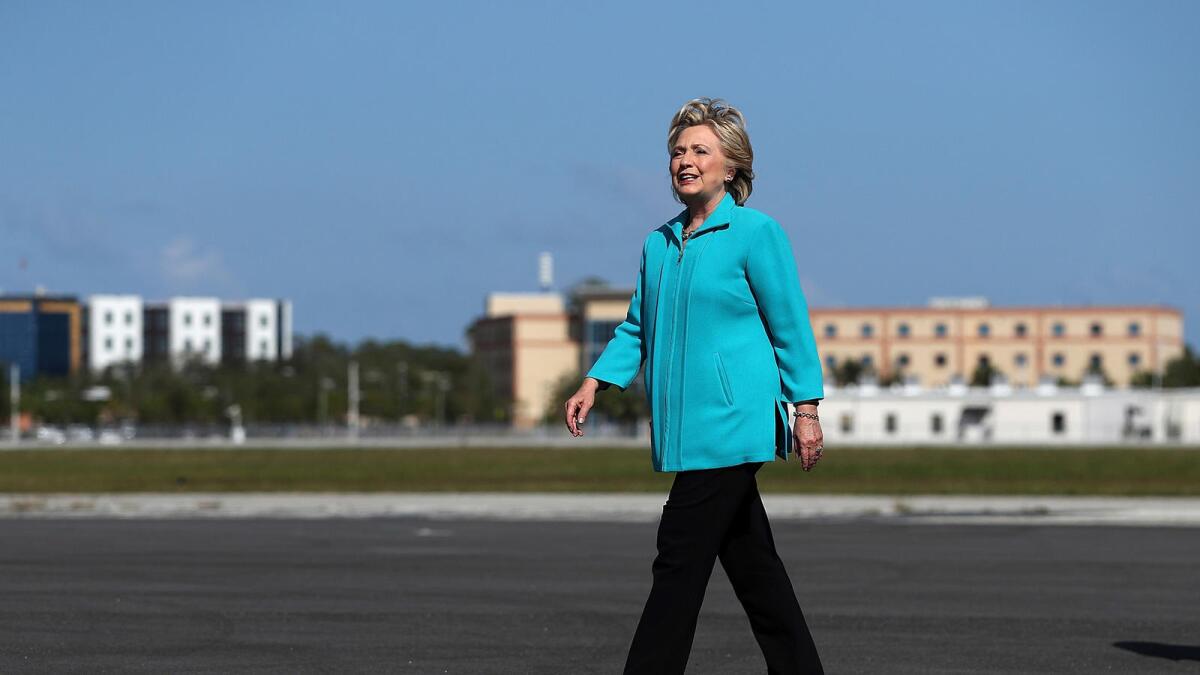
Several more days will have to pass before pollsters can assess for certain how much Friday’s news about newly found emails related to Hillary Clinton will change the presidential race.
The early verdict: Voters haven’t moved much.
The email news came at a time when polls already had showed some degree of tightening in the presidential race: Clinton’s lead over Donald Trump in polling averages has dropped by a point or two over the last week, with some surveys showing a bigger decline. The drop has mostly come as a result of Republicans who had moved away from Trump edging back toward him as election day approaches.
The key question for the next week is whether the email news will cause a bigger move, prompting previous Clinton supporters to abandon her.
The best evidence so far comes from the CBS/YouGov Battleground Tracker survey. That poll has been querying voters throughout the campaign in 13 competitive states — Arizona, Colorado, Florida, Georgia, Iowa, Michigan, North Carolina, New Hampshire, Nevada, Ohio, Pennsylvania, Virginia and Wisconsin.
After FBI Director James B. Comey released a letter Friday telling Congress that agents had found a batch of emails that might be relevant to their investigation of how Clinton handled classified material while she was secretary of State, the pollsters contacted 4,500 likely voters who had previously been surveyed earlier in October to see whether the news had changed how they viewed the race.
Overwhelmingly, they found, voters had heard the news — by Saturday, roughly 8 in 10 were aware of it, with almost 4 in 10 saying they had heard “a lot.”
But nearly all were viewing the news through lenses shaped by their previous choices: Republicans who had never supported Clinton said the email news made them even less likely to back her. Democrats said the news would not change their plans to vote for her.
About 6 in 10 Democrats said they agreed with the statement that the emails were “not that important, they’re making too much of it.” Another 3 in 10 said they thought the email news was “bad, but not as bad as things I dislike about Donald Trump.”
Only 5% of voters overall said that they might switch their votes once they find out what the emails actually say. Those voters, of course, may be disappointed because FBI officials have said they are unlikely to finish reviewing the newly found emails until after election day. Currently, they can’t say whether any of the messages are even new, as opposed to duplicates of emails they’ve already analyzed.
Among Clinton supporters, 53% said the news would have no impact on their vote, 1 in 8 said it would make them more likely to vote for her and 27% said they already had voted, YouGov found. Only 1% said the news would make them less likely to back her.
Of the much smaller number who had been undecided earlier in the month, 1 in 5 said the news made them less likely to back Clinton, about half said it would have no impact on them, and just under 1 in 5 said they already had voted.
The early voting numbers are particularly important in some of the key battleground states. In Arizona, for example, YouGov estimates that about 40% of voters have already cast ballots. In North Carolina, it’s about 30%. In Colorado, where all voters get mail-in ballots, a similar share, just short of 3 in 10, have already sent theirs in, the poll indicated.
Separately, the CBS/YouGov poll questioned voters in four battleground states: Arizona, Colorado, North Carolina and Pennsylvania. Clinton leads in three of them, the surveys found. Trump was ahead 44% to 42% in Arizona.
In North Carolina, the poll showed Clinton ahead by 3 points, 48% to 45%. An NBC/Marist poll, also released on Sunday, showed a bigger Clinton lead there, 47% to 41%. President Obama carried North Carolina in 2008, but Mitt Romney carried the state for the Republicans four years ago. It’s almost certainly a must-win for Trump.
The NBC/Marist poll, however, showed the two nearly tied in Florida, with Clinton holding a 45%-44% lead, well within the poll’s margin of error of 3.1 percentage points in either direction.
The CBS/YouGov poll has a margin of error of 1.9 percentage points in either direction.
Clinton campaign chief admits email server turned out to be ‘major problem’
Even as he criticized the FBI director for his latest disclosure about emails, a top aide to the Hillary Clinton campaign on Sunday acknowledged the obvious: The decision to use a private server for her email has turned out to be a “major problem” in her quest to be president.
“I think she didn’t give it that much thought when she did it in the first place,” campaign Chairman John Podesta said on CNN. He said she did it for “convenience.”
He added: “It’s the kind of a decision that I think needed more thought, more review, and she didn’t do it. And she regrets that.”
Nine days before the election, as Clinton’s campaign hoped to be cruising in for a victory, Podesta and other top campaign officials were instead scrambling to reassure voters that no new secrets were hiding on the laptop that FBI agents seized during an investigation into Anthony Weiner, estranged husband of Clinton aide Huma Abedin.
Along with other Clinton representatives, Podesta on Sunday again pushed for Comey to release more information about what agents found.
WikiLeaks has released emails hacked from Podesta’s account that show he and other top aides were incredulous about the news of Clinton’s server, and wondered why she wasn’t more forthcoming about it earlier. “Unbelievable,” Podesta wrote in one email.
Podesta said he’s survived as a Clinton advisor by telling her things she might not want to hear.
“She takes hard advice,” Podesta said Sunday. “She respects people who will get up in her face.”
The Clinton campaign says it can’t release the newfound emails. Here’s why
As Hillary Clinton’s campaign pushes for the release of more information about a new trove of emails, its leaders faced a new question: Why don’t you release the emails yourselves?
FBI Director James Comey roiled the presidential race on Friday by announcing that the bureau had learned of a new cache of emails that might be relevant to the investigation, closed over the summer, of whether a crime was committed during Hillary Clinton’s use of a private email server. The new emails surfaced in an unrelated investigation of former Rep. Anthony Weiner, the estranged husband of top Clinton aide Huma Abedin.
“Why didn’t she just turn to Huma and say, ‘Put those emails out’?” said Indiana Gov. Mike Pence, Trump’s running mate, on NBC’s “Meet the Press” on Sunday.
Clinton campaign spokesman Brian Fallon and other representatives said that’s not possible.
“Only Comey possesses the laptop and knows its contents,” he tweeted. “Not possible for campaign to ‘get out ahead’ of story and release emails ourselves.”
Clinton campaign manager Robby Mook said that’s the FBI’s job.
“Director Comey hasn’t said whose emails these are,” Mook also said on “Meet the Press.” “And so for us to take any action before he’s clarified or before anybody’s reached out to Huma Abedin from the Justice Department, that would be totally premature.” He also said that Abedin has already turned over all of her emails.
Clinton campaign chairman John Podesta said Abedin is “absolutely” continuing with her duties traveling with the candidate and running her campaign’s scheduling and advance operation.
“She’s played a central and vital role in the campaign,” he said on CNN’s “State of the Union.”
Trump’s campaign manager calls man’s anti-Semitic shouts ‘deplorable’
About that “basket of deplorables.”
Donald Trump’s campaign manager Kellyanne Conway said Sunday that the man yelling “Jew-S-A!” at the press during the candidate’s rally in Phoenix does not represent the campaign.
“That man’s conduct was deplorable,” she said on CNN. “Had I been there, I would have asked security to remove him immediately. Clearly, he doesn’t speak for the campaign or the candidate.”
Conway added: “And I think what he had to say was disgusting.”
Trump’s campaign has energized the anti-Semitic white nationalist movement like no nominee has in decades, with many groups who usually sit out elections campaigning for him.
The tone of Trump’s campaign led Democrat Hillary Clinton to label Trump’s supporters a “basket of deplorables,” describing them as “racist, sexist, homophobic, xenophobic, Islamophobic — you name it.”
The term has become a rallying cry among Trump backers who now use it as social media handles and broadcast it on T-shirts.
During the packed Trump rally Saturday at the Phoenix Convention Center, the man approached the cameras and journalists in the press pen and repeatedly shouted the anti-Semitic slogan and raising his arms.
CNN host Jake Tapper pressed Conway on why Trump does not more forcefully rejected the support from nationalists and others identified with hate groups, and condemn their actions.
Trump initially wavered this year when asked about the support he was getting from former Ku Klux Klan leader David Duke before more forcefully disavowing any connection. One California nationalist leader is self-funding radio ads for Trump.
Conway said Trump has distanced himself from those people who she said are not the “vast majority” of Trump supporters.
“These are USA-loving Americans, she said. “Don’t besmirch the good hearts and the good values of the tens of thousands, the millions of Donald Trump supporters who, frankly, just love this country.”
Hillary Clinton turns to Scripture: ‘Suffering produces endurance’
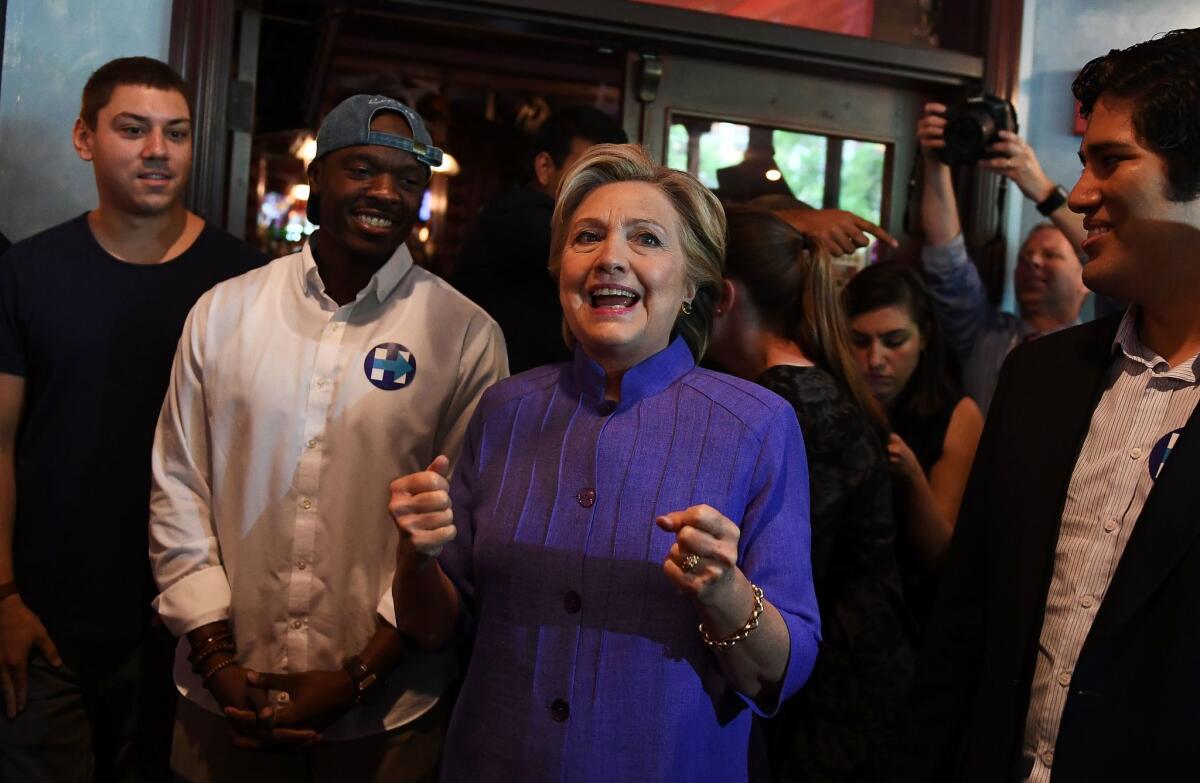
For Hillary Clinton, political life has brought a series of trials and tribulations. The repeated embarrassments of her husband’s infidelities. A failed first presidential campaign. The ceaseless – and to her supporters, baseless – investigations into her tenure as the country’s top diplomat.
Clinton didn’t mention any of this during her speech to the black parishioners at a Baptist church here Sunday. But the theme of perseverance was threaded through the remarks she delivered two days after the FBI said it was examining additional emails related to her private email server.
“Suffering produces endurance,” she said, quoting Romans 5:3. “And endurance produces character. And character produces hope.”
As Clinton often does, she traced the lesson of endurance to her mother, who was abandoned by her parents and suffered a difficult childhood.
“Everyone is knocked down in life,” Clinton said. “What matters is whether you get back up.”
Clinton visited the church after a stop at an Irish pub in downtown Miami where Democratic groups were holding a brunch to promote early voting.
“I want you to get fired up,” she told about 40 supporters. “These last nine days we can really race to the finish line.”
For Trump’s campaign, the FBI letter is a new weapon to sow doubts about Clinton
Donald Trump’s running mate Sunday seized on new revelations by the FBI director to drive home voters’ doubts about the trustworthiness of Hillary Clinton, saying they are are a reminder that she is a “risky choice” to be president.
Indiana Gov. Mike Pence, along with campaign manager Kellyanne Conway, signaled in television interviews how the Trump campaign hopes to pull off an upset victory in next week’s election: by a relentless focus on the controversy that began with Clinton’s decision to use a private server for her emails while she was secretary of State.
FBI Director James Comey’s decision to inform Congress on Friday that new emails had been uncovered created a reversal for the Trump campaign, which has spent months criticizing the decision not to prosecute Clinton.
“The decision by the FBI here, I think, is encouraging to millions of Americans,” Pence said on NBC’s “Meet the Press.” “Because No. 1, the FBI director is keeping his word to the Congress that if new pertinent information came forward that justified the reopening of the case, that he would alert the Congress. He has done that.”
Conway said the new review will serve as a reminder of Clinton’s email problem in the closing days of the campaign: “For voters at this stage, this plays into their whole reluctance about Hillary Clinton,” she said on ABC’s “This Week.”
Clinton’s running mate, Tim Kaine, amplified his campaign’s criticisms of Comey, saying that he violated longstanding Department of Justice protocols about steering clear of actions that could influence elections and revealing information about ongoing investigations.
Kaine, a Virginia senator and former governor who said he has known Comey since he was a federal prosecutor in the state, said he was mystified on why Comey decided to send the letter – particularly in light of reports that the FBI has not yet reviewed the emails, which surfaced as part of an unrelated sexting investigation involving Anthony Weiner, husband of close Clinton aide Huma Abedin.
“You can’t break both these protocols and leave it hanging out there with a question mark,” Kaine said on “This Week.” “You owe people the complete information. If he hasn’t seen the emails, they need to make that completely plain.”
Campaign says Melania Trump will give speech this week
Melania Trump has largely stayed off the campaign trail since the discovery that part of her Republican convention speech this summer was plagiarized from Michelle Obama.
The race to 270: Which states are in play?
A presidential candidate needs 270 electoral votes to win the White House. Most states predictably vote red or blue, but a small handful swing either way and make up the main election battlegrounds. What does it take to win the presidency?